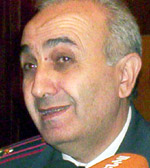“Although brutalities and other inhumane acts, or punishment by law are forbidden, however, Armenian police continue to apply those methods. Witnesses continue to tell police about such abuses on citizens when they are either arrested or persecuted. Citizens have not said everything about police brutalities with the fear that police might get revenge. Human rights NGOs are speaking out and say that police beat the delinquents in the jail before they appear in court. Although the arrested criminals have a right to ask permission from the prosecutors and police to take a forensic medicine examination in order to prove the bruises by the police, however, according to the human rights NGOs, the authorities have rarely allowed anyone to take a forensic medicine examination and no police officer has been sentenced for the attacks.” This is part of the report on Armenian police prepared by the U.S. State Department.
During a press conference yesterday, “168 hours” asked head of the department of criminal investigation Hayk Militonyan what he thought of the accusations made by the U.S. State Department. It turned out that Militonyan didn’t even know about the report.
“I still haven’t seen any accused criminal not get a forensic medicine examination. If there is certain evidence, I would like to see it. They are mixing a few things up. Did that happen at the prison, or somewhere else? I don’t understand. We can just consider that a question with no answer,” said Mr. Militonyan.
The head of the criminal investigation department also commented on the recent crimes, which caused a scandal among society. Based on the first crime, on February 3 of this year, money transferor Alexan Davtyan was killed while leaving the bank and he lost nearly 160,000 dollars. The other crime was on March 4, when owner of the “Kaghtsrik” INC Ashot Vartanyan was shot in front of the building on 37 Sayat Nova street in Yerevan. In fact, the crime was committed in the daytime.
In regard to the money transferor’s murder, head of the criminal investigation department said that the money transferors were not very careful and that’s why those crimes took place.
“Unfortunately, money transferors don’t have normal forms of transportation. It is so easy to commit those kinds of crimes,” said Mr. Militonyan. According to him, issues concerning bank consultants were solved before the crimes “through contacts with different banks and defense teams. The police have nothing to do with their licensing.”
However, after the second crime, the police came to the conclusion that they need to set regulations. From now on, the police will license money transferors. As for the murder on Sayat-Nova street, Militonyan said that the police will soon reveal that case.
“That case is under investigation. There are some variants, but I don’t wish to discuss them now. I hope that we will have enough information soon,” said Mr. Militonyan.
Hayk Militonyan presented a list of crimes committed this year up to March 1 and compared them to the list of crimes last year during the same period. According to that list, as of March 1, 2006, there have been 1342 registered crimes in Armenia compared to the 1526 last year. The majority of crimes that have been investigated include murder, murder attempts, rape and attempts to rape, as well as illegal sale of drugs. While discussing the work done by police in revealing the crimes, Militonyan said that the number of cases revealed had gone to 62%, compared to January-February 2005, when it was 64%. Police reason that the government may change its attitude towards police if cases remain unrevealed, so they refuse to take any written complaints by citizens and ask them not to. Even head of the criminal investigation department assured this:
“I think there have been 21 or 22 similar cases. The police administration have investigated some of the cases and then sent some materials to the prosecutor’s office,” said H. Militonyan.

